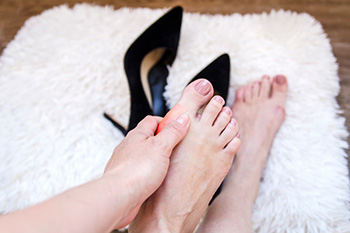
High heels may look great, but they can cause significant foot problems and impact overall body health. The pressure and angle of high heels can lead to a range of issues, such as bunions, hammertoes, and neuromas, often requiring surgery to correct. Wearing high heels also affects your posture, which can lead to back, leg, and foot pain as the body tries to compensate for the imbalance they create. The altered gait from wearing heels can overwork the hip flexors and knee muscles, increasing the risk of joint and muscle pain. Balance is also compromised, increasing the likelihood of falls and sprained ankles. High heels force the lumbar spine to flatten and the thoracic spine to curve excessively, possibly causing chronic back pain. The continuous flexing of hip muscles can lead to their contraction and shortening, contributing to hip and lower back pain. Consulting a podiatrist can provide valuable insights and treatments tailored to individual needs. If you have foot pain related to wearing high heels, it is suggested that you schedule an appointment with a podiatrist for a diagnosis and treatment.
High heels have a history of causing foot and ankle problems. If you have any concerns about your feet or ankles, contact one of our podiatrists from Princeton Foot and Ankle Associates. Our doctors can provide the care you need to keep you pain-free and on your feet.
Effects of High Heels on the Feet
High heels are popular shoes among women because of their many styles and societal appeal. Despite this, high heels can still cause many health problems if worn too frequently.
Which Parts of My Body Will Be Affected by High Heels?
- Ankle Joints
- Achilles Tendon – May shorten and stiffen with prolonged wear
- Balls of the Feet
- Knees – Heels cause the knees to bend constantly, creating stress on them
- Back – They decrease the spine’s ability to absorb shock, which may lead to back pain. The vertebrae of the lower back may compress.
What Kinds of Foot Problems Can Develop from Wearing High Heels?
- Corns
- Calluses
- Hammertoe
- Bunions
- Morton’s Neuroma
- Plantar Fasciitis
How Can I Still Wear High Heels and Maintain Foot Health?
If you want to wear high heeled shoes, make sure that you are not wearing them every day, as this will help prevent long term physical problems. Try wearing thicker heels as opposed to stilettos to distribute weight more evenly across the feet. Always make sure you are wearing the proper shoes for the right occasion, such as sneakers for exercising. If you walk to work, try carrying your heels with you and changing into them once you arrive at work. Adding inserts to your heels can help cushion your feet and absorb shock. Full foot inserts or metatarsal pads are available.
If you have any questions please feel free to contact our offices located in Princeton, and West Windsor, NJ . We offer the newest diagnostic and treatment technologies for all your foot and ankle needs.
